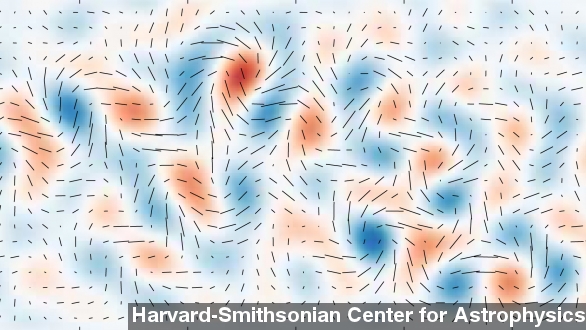If you checked out science news sites last week, you might have seen rumors of a major scientific discovery set to be announced Monday. The rumors said the discovery, if true, would be a shoe-in for a Nobel Prize. (Via The Guardian, Popular Science, Universe Today)
The rumors turned out to be true, but come Monday, there wasn't a peep on the discovery from CNN, Fox News, or MSNBC. And it's not hard to grasp why: turns out it's really, really hard to explain.
The discovery deals with the Big Bang, and specifically what happened in the tiny fractions of a second immediately after the universe began. It's a time period scientists would love to get a closer look at, because understanding what happened in those first few moments could reveal whole new kinds of physics.
Using a telescope at the South Pole and technical and scientific expertise from more than a dozen universities and organizations, like Stanford University, NASA and the Harvard-Smithsonian Center for Astrophysics, researchers now say they've gotten the earliest-ever look at that critical time period. (Via Wikimedia Commons / Christopher Michel)
A detailed explanation is way over our heads, so here's the quick and dirty version.
Scientists have known the universe is expanding since Edwin Hubble observed the galaxies moving away from each other in 1929. The expansion continues to this day, and Harvard researchers discovering in 1998 that the expansion is actually getting faster and faster. (Via NASA, Harvard-Smithsonian Center for Astrophysics)
But in 1980, physicist Alan Guth put forward that, during the universe's first moments, and for an unimaginably brief period of time, the rate of expansion surged to incredible speeds before slowing back down again. (Via NASA)
Now, that animation from NASA showing this inflationary phase is a bit misleading because it shows galaxies. The best estimates we could find are that the universe started that time period at billionths the size of a proton and ended somewhere around the size of a golf ball.
Monday's discovery is that gravitational waves caused by that inflation are still around today, and have been observed for the first time. That's where it gets really tricky to explain. (Via Harvard-Smithsonian Center for Astrophysics)
In trying to illustrate what gravitational waves are, The Guardian compared them to "tiny waves on a lake – from far away, the lake's surface looks glassy smooth; only up very close can the details of the surface be seen."
The BBC went another route. "I've got a sock here which I can try and illustrate with you. Basically, when these waves go through the universe they stretch and squeeze it like that."
We couldn't find a way to explain gravitational waves with anything more mundane than a sock. But perhaps neither we nor most broadcast journalists fully understand that part of it anyway.
So what does it all mean, and what implications does this have for physics? Well, out of all the theories of inflation out there, the findings point to one in particular, meaning scientists can now focus more in that direction.
Slate's resident astronomer Phil Plait points out the findings could help reconcile Einstein's theory of relativity with the field of quantum mechanics. And physicist Lawrence Krauss got all poetic about it.
"This is not only a Nobel Prize, but this is a game changer. ... It turns metaphysics and speculation into hard science." (Via KAET)
Of course, that's all assuming the findings hold up. With something this important, other experiments will need to confirm it. But for physicist Andrei Linde, who predicted this discovery back in the 1980's, this is about the most affirmation you can get. Stanford provided a video of him hearing the news for the first time.
"If this is true, this is a moment of understanding of nature of such a magnitude that it just overwhelms."


